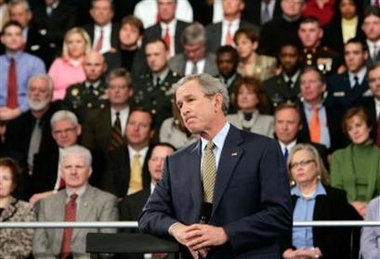|
Bush shrugs off spy program questions
(AP)
Updated: 2006-01-12 11:25
After initial reservations, US President Bush said Wednesday that he isn't
bothered by congressional hearings into his domestic spying program as long as
they don't aid the enemy.
"That's good for democracy," Bush said, provided the hearings don't "tell the
enemy what we're doing."
In the days after the secret wiretapping without warrants was revealed, Bush
cautioned against hearings, saying that congressional leaders had been privately
consulted and that he had worked within the law to authorize eavesdropping on
Americans with suspected ties to terrorists.
Senate Judiciary Chairman Arlen Specter has promised hearings on the issue,
and the Senate Intelligence Committee could also investigate. House Democrats
have asked their Intelligence Committee for hearings, and Democrats on the House
Judiciary Committee plan to hold a forum on the monitoring program's legal
ramifications on Jan. 20.
In Louisville, Bush hosted a casual, town hall-type event reminiscent of his
campaign stops. Bush paced, with microphone in hand, like a talk show host in
front of signs that left no doubt about the administration's message of the day:
"Winning the War on Terror."

US President Bush listens to a question while
delivering comments about the U.S. military involvement in Iraq at the
Kentucky International Convention Center in Louisville, Kentucky, January
11, 2006.[Reuters] | Bush's approval rating bumped up slightly to 42 percent in December, but it
remains low, with 40 percent of Americans approving and 59 percent disapproving
of the way he's doing his job, according to the latest AP-Ipsos poll conducted
the first week of January.
After his opening remarks, Bush fielded about 10 questions from the audience
of invited groups. White House press secretary Scott McClellan said the
questions were not prescreened. Bush said no topics were off-limits, and even
invited a question about Iran, but nobody asked one.
Instead, the audience wanted to know about the war, terrorism and a host of
domestic issues, including health care, education and immigration.
Bush acknowledged differences over Iraq. "Whether you agree with me or not,
we're doing the right thing," Bush said, adding that terrorists or insurgents
fighting democratic reform in Iraq are "not going to shake my will."
A 7-year-old boy's question — "How can people help on the war on terror?" —
gave Bush an opening to score some political points against his critics and try
to keep Democrats from using Iraq as an issue in this year's midterm elections.
"It's one thing to have a philosophical difference — and I can understand
people being abhorrent about war. War is terrible," Bush said. "But one way
people can help as we're coming down the pike in the 2006 elections is remember
the effect that rhetoric can have on our troops in harm's way, and the effect
that rhetoric can have in emboldening or weakening an enemy."
It was the second day in a row that Bush warned his critics to watch what
they say or risk giving comfort to U.S. adversaries. On Tuesday, before a
gathering of Veterans of Foreign Wars, he said Democrats who do will suffer at
the ballot box in November.
Bush appeared in a Kentucky district where Andrew Horne, an Iraqi war veteran
who opposed the invasion, is hoping to unseat Republican Rep. Anne Northup, a
strong Bush supporter.
None of the questions Bush received at the Kentucky International Convention
Center were combative. Viewpoints were different across the street, where about
200 noisy demonstrators protested Bush's policies.
Renee Woodrum of Louisville said, "When I think it can't get any worse and
then I hear some other scandal or some corrupt thing that's going on or more
soldiers are dying, and I can't believe it."
"I just don't know how much longer America can afford to have George Bush as
our president. I think the war is causing more hatred toward America and
encouraging terrorism."
|